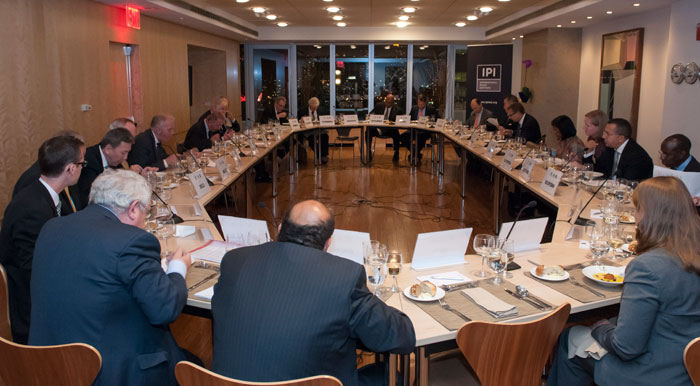 A ministerial-level dinner on “Strengthening the Partnership: A Fresh Dialogue on UN Peacekeeping,” held on September 25th provided a chance for key stakeholders in the UN peacekeeping system to engage on a range of issues to help inform the way towards a strengthened peacekeeping partnership for the future.
A ministerial-level dinner on “Strengthening the Partnership: A Fresh Dialogue on UN Peacekeeping,” held on September 25th provided a chance for key stakeholders in the UN peacekeeping system to engage on a range of issues to help inform the way towards a strengthened peacekeeping partnership for the future.
The meeting was hosted by the government of Finland and the government of Uruguay, along with the International Peace Institute.
Peacekeeping is one of the international community’s most effective–and cost-effective–tools for restoring international peace. It is a unique mechanism for collective action, but peacekeeping is only as strong as its partnerships with the countries who contribute personnel, financing, and political support and engagement.
During a wide-ranging, informal discussion among a group of 30 high-level member state officials, several key themes emerged:
1. The challenges posed by riskier environments and asymmetric threats: This is largely new terrain for UN peacekeeping and questions remain related to how the UN can better ensure the safety and security of its own personnel as well as protect host country civilians. Some questioned whether the UN has adequate capabilities to deal with such threats and implement its mandate.
2. Resourcing: In recent years, more challenging mandates have combined with a global financial recession to put into stark relief the peacekeeping resource challenge. UN peacekeeping has been asked to do “more with less,” a premise that could prove untenable given current and future challenges on the horizon. It was also noted that many integral projects related to the peacebuilding mandate of peacekeeping missions rely on voluntary funding, which lacks the necessary predictability.
3. UN peacekeeping’s legitimacy: Ensuring the continued legitimacy of UN peacekeeping is even more important today, given the riskier environments and complex tasks in which peacekeepers are engaged. Possible risks to the legitimacy of UN peacekeeping mentioned were varied, including: a blurring of the line between peacekeeping and peace enforcement, an overreliance on troop and police contributions from a few countries in the global south, and the continued (albeit diminished) allegations of sexual exploitation and abuse by peacekeepers.
4. The use of new technologies: The use of unmanned aerial vehicles in peacekeeping will not be a panacea, but their use, along with the introduction of other new technologies, could vastly improve peacekeepers’ operational awareness, responsiveness, safety, and potentially lead to cost savings.
5. Partnerships with regional organizations: While financing, logistics and support capacities are still concerns for African regional and sub-regional peace operations, there is no doubt that the will exists to develop those capacities and play a larger role in conflict management on the continent. Participants urged greater efforts by member states to provide financing, training, and other capacity building measures to regional organizations and regional training centers.
6. Partnership with host countries: The peacekeeping partnership includes the Security Council, the Secretariat, TCC/PCCs, but also, importantly, host countries. UN’s partnership with the countries that host peace operations is critical to success and those countries should always have a seat at the table.
7. Peacekeeping governance: The failure of the General Assembly’s Special Committee on Peacekeeping (C-34) to hold substantive negotiations in 2013 was lamented by several participants. The importance of the C-34 for facilitating dialogue among the various peacekeeping constituencies was highlighted and a plea was made to find creative solutions soon to the issues that prevent substantive C-34 negotiations.







